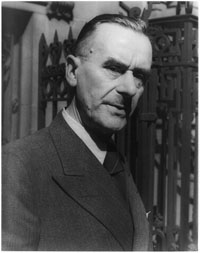a. Nach der Niederschrift des Briefes notierte Mann am 31. 1. 1936 in sein Tagebuch:
„Ich bin mir der Tragweite des heute getanen Schrittes bewusst. Ich habe nach 3
Jahren des Zögerns mein Gewissen und meine feste Überzeugung sprechen
lassen. Mein Wort wird nicht ohne Eindruck bleiben.“





Presentation
Thomas Mann was a German author. He is one of the best-known authors of the 20th century. In 1929 he was awarded the Nobel Prize in Literature for Buddenbrooks (published in 1901). In this novel he describes the self-perception of the Hanseatic bourgeoisie, on the example of a merchant family. His older brother Heinrich and three out of his six children: Erika, Klaus and Golo were also writers.
In his novel Mario and the Magician Thomas Mann deals with the Italian fascism. To show how the mass suggestion works he describes the performance of a magician in a small town. He also expressed his opinions in numerous speeches. For example, in 1930 in a speech given at the Beethovensaal in Berlin he described National Socialism as a ‘major wave of eccentric barbarism and primitive funfair barbarism.”
The decision to emigrate wasn’t easy for Thomas Mann. He went to Switzerland via France, and in 1938 he emigrated to the USA. In France, shortly after he emigrated, Mann suffered from deep depression.